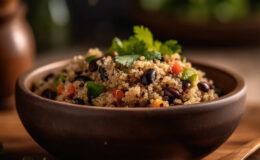How much protein does your body actually need? The answer depends on a few factors, including your body weight, activity level, and fitness goals. As a fitness resource, one of the most common questions we receive is how much protein should I be consuming. Continue reading to learn more.
What is Protein
Protein is an essential macronutrient that is responsible for building and repairing muscles, and it’s important to ensure that you’re getting enough of it to support your fitness goals.
How Much is Needed
For the average sedentary adult, the recommended daily intake of protein is around 0.8 grams per kilogram of body weight. However, for individuals who are regularly engaging in strength training or other forms of intense exercise, the recommended daily intake can be as high as 1.4-2.0 grams per kilogram of body weight.
To put this into perspective, let’s say you weigh 70 kilograms and are looking to build muscle. Based on the above recommendations, you would need to consume anywhere from 98 to 140 grams of protein per day.
When Should it Be Consumed
It’s also worth noting that the timing of your protein intake can play a role in muscle growth and recovery. Consuming protein within 30 minutes to an hour after a workout can help to stimulate muscle protein synthesis and improve recovery time.
While it’s important to ensure that you’re getting enough protein to support your fitness goals, it’s also important to consider the source of your protein. Animal sources such as meat, eggs, and dairy products are high in protein, but they also tend to be high in saturated fat and cholesterol. Plant-based sources such as beans, lentils, and tofu can be great sources of protein without the added fat and cholesterol.
Types of Protein
When it comes to protein, there are several different types to consider. Here are some of the most common types of protein and how they differ:
- Whey Protein: Whey protein is a fast-digesting protein that is commonly found in dairy products. It’s a complete protein, meaning that it contains all nine essential amino acids that your body needs to function properly. Whey protein is often used by athletes and bodybuilders to promote muscle growth and recovery.
- Casein Protein: Casein protein is another type of protein that is found in dairy products. It’s a slow-digesting protein, meaning that it can provide a steady supply of amino acids to your muscles over an extended period of time. Casein protein is often used as a nighttime protein source to help prevent muscle breakdown while you sleep.
- Soy Protein: Soy protein is a plant-based protein that is derived from soybeans. It’s a complete protein, making it a great alternative for vegans or individuals who are lactose intolerant. Soy protein has also been shown to have some health benefits, including reducing cholesterol levels.
- Pea Protein: Pea protein is another plant-based protein that is derived from yellow peas. It’s a good source of protein for vegans and vegetarians, and it’s also hypoallergenic, making it a good option for individuals with food allergies or sensitivities.
- Hemp Protein: Hemp protein is another plant-based protein that is derived from hemp seeds. It’s a complete protein, making it a good option for vegans and vegetarians. Hemp protein is also rich in fiber and healthy fats, making it a good choice for overall health and wellness.
When it comes to choosing a protein source, it’s important to consider your individual needs and preferences. Some people may prefer animal-based proteins, while others may prefer plant-based options. Ultimately, the most important factor is to ensure that you’re getting enough protein to support your fitness goals and overall health.
In conclusion, the amount of protein your body needs depends on your body weight, activity level, and fitness goals. Aim for 0.8-2.0 grams of protein per kilogram of body weight, and consider the source of your protein to ensure that you’re meeting your nutritional needs in a healthy and sustainable way.
References:
- American College of Sports Medicine, et al. (2016). Nutrition and Athletic Performance. Medicine and Science in Sports and Exercise, 48(3), 543-568.
- Phillips, S. M., & Van Loon, L. J. (2011). Dietary protein for athletes: from requirements to optimum adaptation. Journal of Sports Sciences, 29(sup1), S29-S38.










